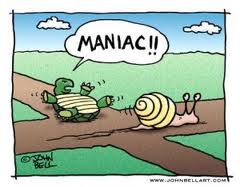A guest post by Mignon Fogarty
It’s a huge thrill for a wordie to come across a particularly well-used word; it’s like a little inside joke shared with the author. It’s not necessary to place these Easter eggs in your writing, but if you can, it’s quite fun for you and a certain segment of your readers.
Take “maudlin” for example. Any of your characters can be maudlin, but it’s a freakin’ home run when a nun is maudlin! The word is derived from Mary Magdalene’s name because in Middle Age art, Magdalene was always portrayed as weeping and downcast. As with so many English words, the spelling morphed over time–from “Magdalene” to “maudlin.”
“Anathema” also has religious origins and is particularly well used to describe something devilish or church-related. Today, anything hated can be anathema, but the word comes from a Greek word used to describe something cursed or devoted to evil. In the 1200s, the Catholic Church had a few different kinds of excommunication, and the harshest–proclaiming someone damned–was called anathematization.
If you write about Medieval times, you may want to use the word “bailiwick.” Today it describes someone’s area of expertise, but in Old English, a bailiwick was something like the bailiff of the village–the overseer.
“Egregious” also has interesting origins; it comes from a root word meaning “flock,” as in a flock of birds. The “e” is a remnant of a prefix that means “out,” so “egregious” means to stand out from the flock, which makes sense when you consider that a disruptive bird would stand out from the flock, just as someone who exhibits egregious behavior would stand out from the crowd. If you can smoothly work “egregious” into a sentence about the behavior of animals (or people) in herds or flocks, it’s a win.
“Galvanize” is related to electricity, “gall” is related to liver bile, “haughty” comes from the French word for “high,” and “inchoate” is related to plow animals. The examples go on and on.
I started being particularly aware of words with interesting origins when I began researching etymology for my 101 WORDS book series. You can develop your own list of words to use in interesting ways by browsing a dictionary or signing up for word-of-the-day lists and jotting down promising words in a notebook or computer file.
Mignon Fogarty is better known as GrammarGirl and her newest book is 101 WORDS TO SOUND SMART (Amazon, Barnes & Noble, Books–a–Million, Indiebound, Powell‘s)


